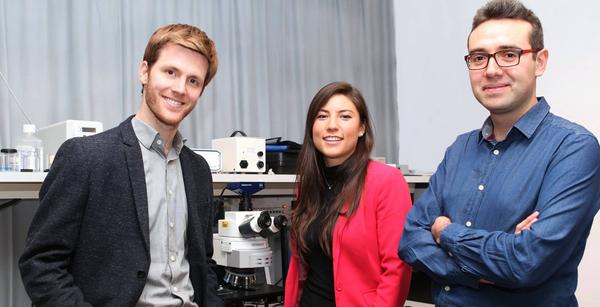Successful Rounds of Financing for Two EPFL Spin-offs

© 2015 EPFL
The start-ups L.E.S.S. and Lunaphore just raised, respectively, 3 and 2 million francs. The former plans to accelerate its sales and develop large-scale production of its ultra-thin lighting system, while the latter will continue the development of its human tissue diagnostic platform.
The nanoactive fiber developed by L.E.S.S. is as thin as a human hair and offers many advantages for technical lighting, for example for the control of a high-speed production line, for automotive lighting or screen backlighting. “The thinness and flexibility of the fiber, combined with the excellent uniformity and directionality of the light it generates, provide vast and uncharted design options,” says Yann Tissot, CEO of the start-up. According to its designers, this innovation could replace LED technology for technical lighting.
A new era of investment in Switzerland
This infusion of CHF 3 million will enable the company to accelerate the commercialization of its technology, particularly by increasing its volume of production in response to growing demand from key customers in Japan, Germany and Switzerland. This influx of capital was made possible by both private and institutional funds (VI Partners). “We are pleased to have convinced three ‘Business Angels of the Year,’ who are all successful entrepreneurs themselves,” explains Tissot. The young company could also count on the financial contribution of the founding members of two other EPFL spin-offs recently acquired by Intel: Composyt Light Labs and Lemoptix. For the CEO of L.E.S.S., “it shows that we are entering a new era in Switzerland’s investment scene where successful founders are reinvesting in start-ups. This is what had been sorely lacking in the local ecosystem, compared to Silicon Valley.”
First round for Lunaphore

Lunaphore © Zuzanna Adamczewska-Bolle
Lunaphore Technologies SA also just completed a capital fund drive – its first – raising 2 million Swiss francs. This EPFL spin-off founded in April 2014 has developed innovative tissue diagnostics, primarily for analyzing and classifying tumors.
The heart of the technology Lunaphore has developed at EPFL over the past 6 years is something called the “Microfluidic Tissue Processor” (MTP). This system increases speed and accuracy in the process required for performing diagnostic tests on tissue samples such as solid tumors. The first application will focus on researching the signatures of certain proteins in tumorous tissues, a procedure known as immunohistochemical analysis. Clinical trials have been conducted with 76 patients with breast cancer. “The results have shown that this device enables this kind of analysis in 5 minutes – compared against 2–8 hours by today’s standards – and the diagnostic results obtained are more accurate than traditional methods used in pathology laboratories,” says Ata Tuna Ciftlik, the company’s CEO.
The 2 million comes from private and public investors (Redalpine Venture Partners) from Switzerland and the United Kingdom. Michael Sidler, who benefits from many years of experience as an investor and entrepreneur in the life sciences in addition to being co-founder of Redalpine, sits on the start-up’s Board of Directors. “Solutions such as Lunaphore,” he says, “are required in a world where medicine is becoming increasingly personalized and determined by biomarker panels.”